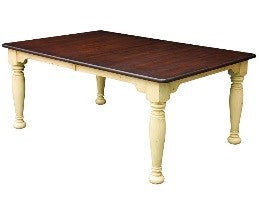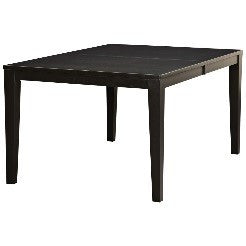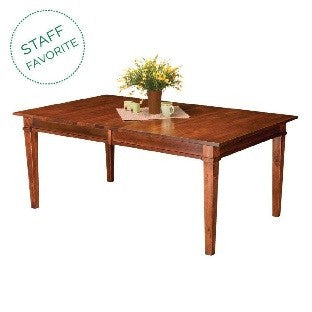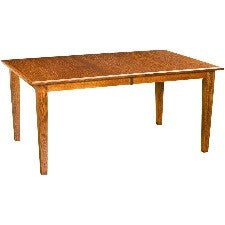Since the mid-1700s, when the first Amish and Mennonite settlers arrived in the USA, these communities, who eventually also became known as the Pennsylvania Dutch, have been living simple, but rich lives, separate from the hurly-burly of modern living, and with unique traditions stretching back to their origins in Europe.

Belleville Leg Extension Table
Among these traditions is the humble Amish kitchen table, which serves as a workplace, a meeting place and the communal center of the home, where food is shared, the workday is planned and discussions of familial gravity are held. Tables like these are built for a couple starting out in their lives together, passed down from generation to generation, and made to last more than one lifetime – the Amish, after all, do not believe in creating waste, but rather in building for the long term.
Amish kitchen tables are created to live in the family home, and usually built to accommodate the family unit plus guests. They are frequently used for housework as well, to knead dough for bread, cut pieces of meat and vegetable for the pot, and prepare dozens of delicacies for celebrations. An Amish kitchen table must be strong, hard-working and able to withstand generations of taking a beating, while still looking as beautiful and strong as the day it was made. If you are looking for an Amish kitchen table to grace your home, here are a few things to look out for:

1 – The Wood
All Amish furniture, including kitchen tables, are made with wood that lasts – good quality hardwood. You can expect a table that lasts for decades, and even centuries, if it is well made and cared for; something your family can also pass on from generation to generation.
2 – Quality of manufacture
An Amish family’s kitchen table is expected to be as hard-working as the people who use it, so every table is made to exacting quality standards. The craft and art of making Amish furniture is taught one-on-one and a craftsman is only allowed to call himself that once his teacher deems his work to be good enough. Mass-production doesn’t happen with Amish kitchen tables, so if your table comes off a factory production line, it isn’t Amish!

3 – The Style
Plain living is at the heart of Amish life – excess decoration, loads of frou-frou and delicate curves and frills are better left to other people, not this community. You can see it in their clothes, their homes and their furniture; simple, hard-working and designed to do a job is the Amish way, and it’s the style you can expect from your table, too. That doesn’t mean every piece isn’t unique and beautiful, of course, it just isn’t covered in curlicues and delicate engravings.
4 – The Manufacturer
Many have tried to replicate Amish furniture, and some have even come close to getting it right, but it isn’t truly Amish if it isn’t Amish-made.

Shaker Mission Leg Extension Table
5 – The Size
Amish kitchen tables, much like their farm tables, are designed to seat as many people as possible. Families are large, extended families even larger, and the work done on these tables can stretch for several feet. A proper Amish kitchen table will seat at least ten people comfortably.

